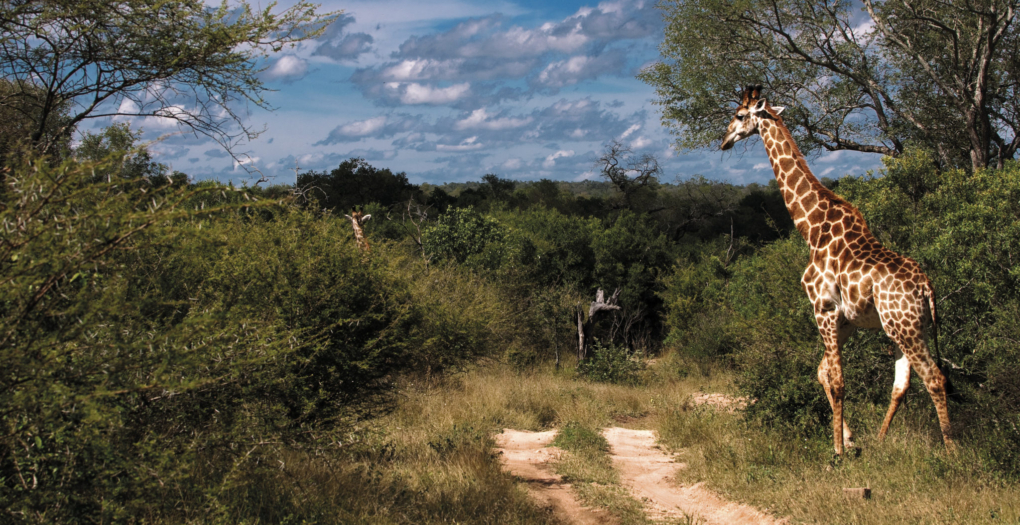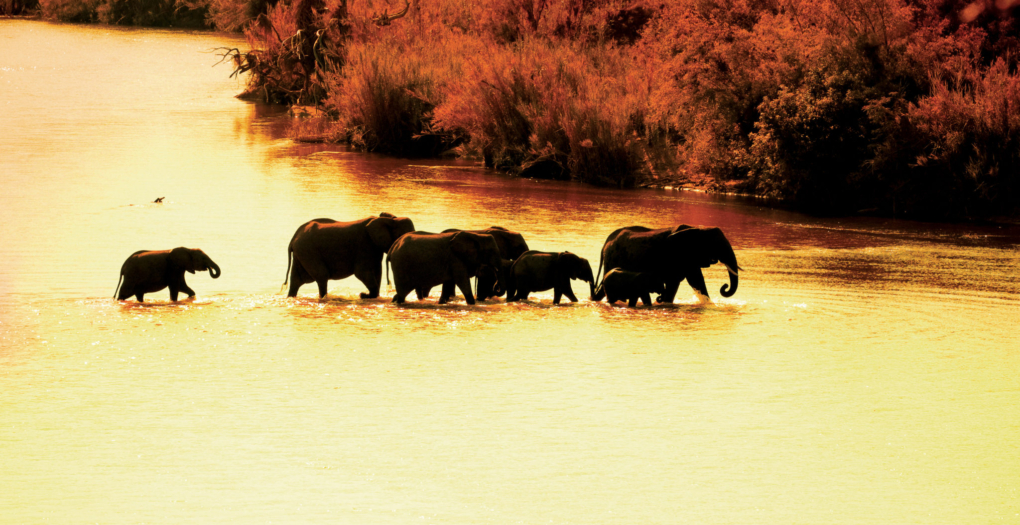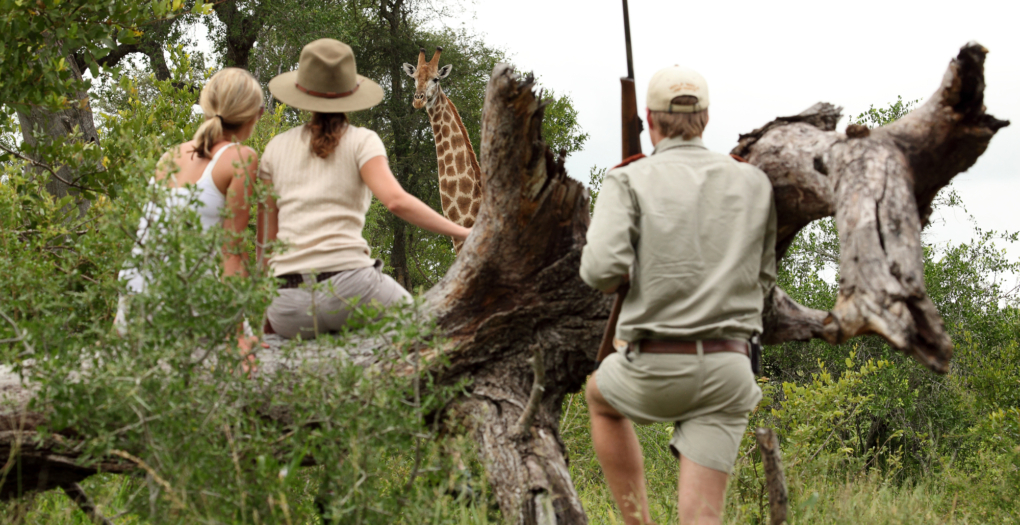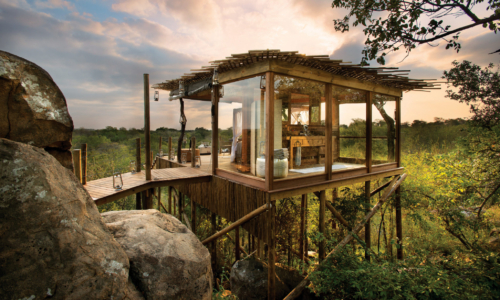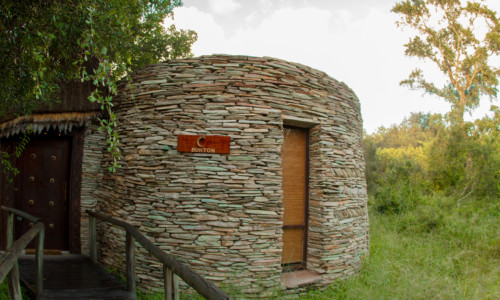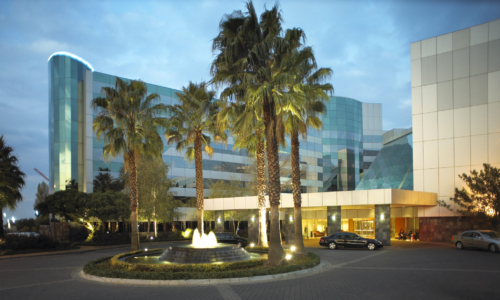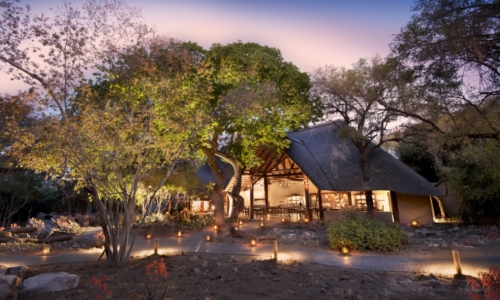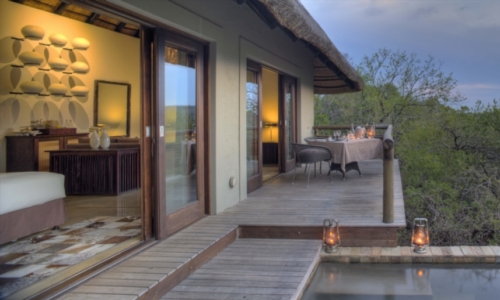Originally known as the Sabi Game Reserve, in 1926 it was renamed Kruger National Park, after its early champion, South African President Paul Kruger. The park has become one of the largest game reserves in Africa and is recognized worldwide for its involvement in ecotourism and plant and animal conservation. Located in the Limpopo and Mpumalanga provinces in northeastern South Africa, the park encompasses 7,500 square miles. The park’s boundaries are defined by rivers on two sides, the Limpopo River to the north, bordering Zimbabwe, and the Crocodile River to the south. The Lebombo Mountains form the eastern boundary of the park, separating it from Mozambique, and the western border runs parallel to the mountains some forty miles away. Most of Kruger is grasslands, known locally as bushveld. Woodlands and rocky hills also dot the landscape, the highest point in the park being a hill called Khandzalive.
Kruger National Park claims 147 species of large mammals, more than any other African game reserve. Webcams are set up to catch sight of the Big Five: elephant, lion, leopard, buffalo, and black and white rhino. Besides supporting the packs of endangered African wild dog, the park is home to many other exciting animals including zebra, cheetah, giraffe, hippo, wildebeest, impala, and spotted hyena.
Over 500 bird species have been spotted in the park, and indigenous reptiles include the black mamba and crocodile. The region’s sixteen different ecosystems provide for not only an abundance of wildlife but also almost two thousand different plant species. Botanical highlights include the thorn tree, red bush-willow, knobthorn tree, marula tree, mopane tree, red grass, and buffalo grass.
Nine entrances welcome guests to the park, and accommodation options are varied. Twenty-one rest camps and fifteen designated private safari lodges operate within the camp. Also available are two private lodge concessions, which are parcels of land operated by private companies in partnership with communities. These properties have a wide range of exciting activities available. Daily game drives in customized 4×4 vehicles are led by expert trackers and guides. Night drives spy on the secret doings of many nocturnal animals. Bush walks are led by armed guides who share their knowledge of the fauna and flora. Self-drive 4×4 trails are available for the more adventurous. Other popular activities include mountain biking from Olifants Camp, hot-air balloon rides, backpacking trails, eco-trails, golfing, and bird-watching. A good bush braai game is an unforgettable experience. A game drive leads visitors to an open area filled with burning lanterns and fires where the food is grilled on open fires as the sounds of the bush echo all around.

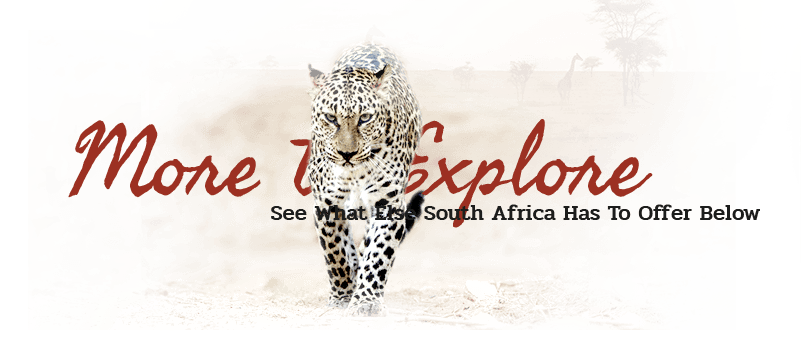
- Africa House
- Arathusa Safari Lodge
- Baobab Hill Bush House
- Boulders Lodge
- Castleton Lodge
- Chitwa Chitwa
- Dulini Leadwood Lodge
- Dulini Lodge
- Dulini River Lodge
- Ebony Lodge
- Ecca Lodge
- Great Fish River Lodge
- Idube Game Reserve
- Ivory Lodge
- Jabulani
- Jackalberry Lodge
- Kambaku River Sands
- Kambaku Safari Lodge
- Kings Camp
- Kirkman’s Kamp
- Lebombo Lodge
- Leopard Hills
- Loapi Tented Camp
- Madikwe Hills
- Madikwe Safari Lodge
- Makanyane Safari Lodge
- MalaMala Main Camp
- MalaMala Sable Camp
- Marataba Mountain Lodge
- Marataba Safari Lodge
- Melote House
- Melton Manor
- Mount Anderson
- Narina Lodge
- Ngala Safari Lodge
- Ngala Tented Camp
- Noka Camp
- Pafuri Camp
- Phinda Forest Lodge
- Phinda Homestead
- Phinda Mountain Lodge
- Phinda Rock Lodge
- Phinda Vlei Lodge
- Phinda Zuka Lodge
- Rattray’s Camp
- River Lodge
- Rocktail Beach Camp
- Royal Malewane
- Sabi Sabi Bush Lodge
- Sabi Sabi Earth Lodge
- Sabi Sabi Little Bush Camp
- Sabi Sabi Selati Camp
- Saseka Tented Camp
- Savanna Private Game Lodge
- Simbambili Game Lodge
- Simbavati River Lodge
- Sweni Lodge
- Tengile River Lodge
- The Farmstead at Royal Malewane
- The Outpost
- Thornybush Game Lodge
- Thornybush River Lodge
- Tinga Lodge
- Tintswalo Family Camp
- Tintswalo Manor House
- Tintswalo Safari Lodge
- Tswalu Motse
- Tswalu Tarkuni
- Tuningi
- Uplands Homestead
- Waterbuck Lodge
- Waterbuck Private Camp
- Babylonstoren
- Birkenhead House
- Bushman’s Kloof
- Cape Cadogan Boutique Hotel
- Cape Grace Hotel
- City Lodge O. R. Tambo Airport Hotel
- Delaire Graff Estate
- Ellerman House
- Fairlawns Boutique Hotel
- Four Rosmead
- Franschhoek Country House
- Grootbos Forest Lodge
- Grootbos Garden Lodge
- Grootbos Private Villas
- Hunter’s Country House
- InterContinental O. R. Tambo Airport Hotel
- Kensington Place
- La Residence
- Le Quartier Francais
- Leeu Estates
- Leeu House
- Lekkerwater Beach Lodge
- More Quarters
- Mount Nelson Hotel
- One&Only Hotel Cape Town
- Rovos Rail
- Saxon Hotel
- Schulphoek House
- Southern Sun O. R. Tambo Airport Hotel
- The Capital Mirage
- The Cellars-Hohenort
- The Commodore Hotel
- The One Above
- The Peech Hotel
- The PortsWood Hotel
- The Residence Boutique Hotel
- The Silo Hotel
- The Turbine Boutique Hotel
- Tintswalo at Boulders
- Tintswalo Atlantic
- Tintswalo Waterfall
- Twelve Apostles Hotel
- Victoria & Alfred Hotel
- Welgelegen Boutique Guest House
- Africa House
- Arathusa Safari Lodge
- Baobab Hill Bush House
- Boulders Lodge
- Castleton Lodge
- Chitwa Chitwa
- Dulini Leadwood Lodge
- Dulini Lodge
- Dulini River Lodge
- Ebony Lodge
- Ecca Lodge
- Great Fish River Lodge
- Idube Game Reserve
- Ivory Lodge
- Jabulani
- Jackalberry Lodge
- Kambaku River Sands
- Kambaku Safari Lodge
- Kings Camp
- Kirkman’s Kamp
- Lebombo Lodge
- Leopard Hills
- Loapi Tented Camp
- Madikwe Hills
- Madikwe Safari Lodge
- Makanyane Safari Lodge
- MalaMala Main Camp
- MalaMala Sable Camp
- Marataba Mountain Lodge
- Marataba Safari Lodge
- Melote House
- Melton Manor
- Mount Anderson
- Narina Lodge
- Ngala Safari Lodge
- Ngala Tented Camp
- Noka Camp
- Pafuri Camp
- Phinda Forest Lodge
- Phinda Homestead
- Phinda Mountain Lodge
- Phinda Rock Lodge
- Phinda Vlei Lodge
- Phinda Zuka Lodge
- Rattray’s Camp
- River Lodge
- Rocktail Beach Camp
- Royal Malewane
- Sabi Sabi Bush Lodge
- Sabi Sabi Earth Lodge
- Sabi Sabi Little Bush Camp
- Sabi Sabi Selati Camp
- Saseka Tented Camp
- Savanna Private Game Lodge
- Simbambili Game Lodge
- Simbavati River Lodge
- Sweni Lodge
- Tengile River Lodge
- The Farmstead at Royal Malewane
- The Outpost
- Thornybush Game Lodge
- Thornybush River Lodge
- Tinga Lodge
- Tintswalo Family Camp
- Tintswalo Manor House
- Tintswalo Safari Lodge
- Tswalu Motse
- Tswalu Tarkuni
- Tuningi
- Uplands Homestead
- Waterbuck Lodge
- Waterbuck Private Camp
- Babylonstoren
- Birkenhead House
- Bushman’s Kloof
- Cape Cadogan Boutique Hotel
- Cape Grace Hotel
- City Lodge O. R. Tambo Airport Hotel
- Delaire Graff Estate
- Ellerman House
- Fairlawns Boutique Hotel
- Four Rosmead
- Franschhoek Country House
- Grootbos Forest Lodge
- Grootbos Garden Lodge
- Grootbos Private Villas
- Hunter’s Country House
- InterContinental O. R. Tambo Airport Hotel
- Kensington Place
- La Residence
- Le Quartier Francais
- Leeu Estates
- Leeu House
- Lekkerwater Beach Lodge
- More Quarters
- Mount Nelson Hotel
- One&Only Hotel Cape Town
- Rovos Rail
- Saxon Hotel
- Schulphoek House
- Southern Sun O. R. Tambo Airport Hotel
- The Capital Mirage
- The Cellars-Hohenort
- The Commodore Hotel
- The One Above
- The Peech Hotel
- The PortsWood Hotel
- The Residence Boutique Hotel
- The Silo Hotel
- The Turbine Boutique Hotel
- Tintswalo at Boulders
- Tintswalo Atlantic
- Tintswalo Waterfall
- Twelve Apostles Hotel
- Victoria & Alfred Hotel
- Welgelegen Boutique Guest House

Originally known as the Sabi Game Reserve, in 1926 it was renamed Kruger National Park, after its early champion, South African President Paul Kruger. The park has become one of the largest game reserves in Africa and is recognized worldwide for its involvement in ecotourism and plant and animal conservation. Located in the Limpopo and Mpumalanga provinces in northeastern South Africa, the park encompasses 7,500 square miles. The park’s boundaries are defined by rivers on two sides, the Limpopo River to the north, bordering Zimbabwe, and the Crocodile River to the south. The Lebombo Mountains form the eastern boundary of the park, separating it from Mozambique, and the western border runs parallel to the mountains some forty miles away. Most of Kruger is grasslands, known locally as bushveld. Woodlands and rocky hills also dot the landscape, the highest point in the park being a hill called Khandzalive.
Kruger National Park claims 147 species of large mammals, more than any other African game reserve. Webcams are set up to catch sight of the Big Five: elephant, lion, leopard, buffalo, and black and white rhino. Besides supporting the packs of endangered African wild dog, the park is home to many other exciting animals including zebra, cheetah, giraffe, hippo, wildebeest, impala, and spotted hyena.
Over 500 bird species have been spotted in the park, and indigenous reptiles include the black mamba and crocodile. The region’s sixteen different ecosystems provide for not only an abundance of wildlife but also almost two thousand different plant species. Botanical highlights include the thorn tree, red bush-willow, knobthorn tree, marula tree, mopane tree, red grass, and buffalo grass.
Nine entrances welcome guests to the park, and accommodation options are varied. Twenty-one rest camps and fifteen designated private safari lodges operate within the camp. Also available are two private lodge concessions, which are parcels of land operated by private companies in partnership with communities. These properties have a wide range of exciting activities available. Daily game drives in customized 4×4 vehicles are led by expert trackers and guides. Night drives spy on the secret doings of many nocturnal animals. Bush walks are led by armed guides who share their knowledge of the fauna and flora. Self-drive 4×4 trails are available for the more adventurous. Other popular activities include mountain biking from Olifants Camp, hot-air balloon rides, backpacking trails, eco-trails, golfing, and bird-watching. A good bush braai game is an unforgettable experience. A game drive leads visitors to an open area filled with burning lanterns and fires where the food is grilled on open fires as the sounds of the bush echo all around.

- Africa House
- Arathusa Safari Lodge
- Baobab Hill Bush House
- Boulders Lodge
- Castleton Lodge
- Chitwa Chitwa
- Dulini Leadwood Lodge
- Dulini Lodge
- Dulini River Lodge
- Ebony Lodge
- Ecca Lodge
- Great Fish River Lodge
- Idube Game Reserve
- Ivory Lodge
- Jabulani
- Jackalberry Lodge
- Kambaku River Sands
- Kambaku Safari Lodge
- Kings Camp
- Kirkman’s Kamp
- Lebombo Lodge
- Leopard Hills
- Loapi Tented Camp
- Madikwe Hills
- Madikwe Safari Lodge
- Makanyane Safari Lodge
- MalaMala Main Camp
- MalaMala Sable Camp
- Marataba Mountain Lodge
- Marataba Safari Lodge
- Melote House
- Melton Manor
- Mount Anderson
- Narina Lodge
- Ngala Safari Lodge
- Ngala Tented Camp
- Noka Camp
- Pafuri Camp
- Phinda Forest Lodge
- Phinda Homestead
- Phinda Mountain Lodge
- Phinda Rock Lodge
- Phinda Vlei Lodge
- Phinda Zuka Lodge
- Rattray’s Camp
- River Lodge
- Rocktail Beach Camp
- Royal Malewane
- Sabi Sabi Bush Lodge
- Sabi Sabi Earth Lodge
- Sabi Sabi Little Bush Camp
- Sabi Sabi Selati Camp
- Saseka Tented Camp
- Savanna Private Game Lodge
- Simbambili Game Lodge
- Simbavati River Lodge
- Sweni Lodge
- Tengile River Lodge
- The Farmstead at Royal Malewane
- The Outpost
- Thornybush Game Lodge
- Thornybush River Lodge
- Tinga Lodge
- Tintswalo Family Camp
- Tintswalo Manor House
- Tintswalo Safari Lodge
- Tswalu Motse
- Tswalu Tarkuni
- Tuningi
- Uplands Homestead
- Waterbuck Lodge
- Waterbuck Private Camp
- Babylonstoren
- Birkenhead House
- Bushman’s Kloof
- Cape Cadogan Boutique Hotel
- Cape Grace Hotel
- City Lodge O. R. Tambo Airport Hotel
- Delaire Graff Estate
- Ellerman House
- Fairlawns Boutique Hotel
- Four Rosmead
- Franschhoek Country House
- Grootbos Forest Lodge
- Grootbos Garden Lodge
- Grootbos Private Villas
- Hunter’s Country House
- InterContinental O. R. Tambo Airport Hotel
- Kensington Place
- La Residence
- Le Quartier Francais
- Leeu Estates
- Leeu House
- Lekkerwater Beach Lodge
- More Quarters
- Mount Nelson Hotel
- One&Only Hotel Cape Town
- Rovos Rail
- Saxon Hotel
- Schulphoek House
- Southern Sun O. R. Tambo Airport Hotel
- The Capital Mirage
- The Cellars-Hohenort
- The Commodore Hotel
- The One Above
- The Peech Hotel
- The PortsWood Hotel
- The Residence Boutique Hotel
- The Silo Hotel
- The Turbine Boutique Hotel
- Tintswalo at Boulders
- Tintswalo Atlantic
- Tintswalo Waterfall
- Twelve Apostles Hotel
- Victoria & Alfred Hotel
- Welgelegen Boutique Guest House
- Africa House
- Arathusa Safari Lodge
- Baobab Hill Bush House
- Boulders Lodge
- Castleton Lodge
- Chitwa Chitwa
- Dulini Leadwood Lodge
- Dulini Lodge
- Dulini River Lodge
- Ebony Lodge
- Ecca Lodge
- Great Fish River Lodge
- Idube Game Reserve
- Ivory Lodge
- Jabulani
- Jackalberry Lodge
- Kambaku River Sands
- Kambaku Safari Lodge
- Kings Camp
- Kirkman’s Kamp
- Lebombo Lodge
- Leopard Hills
- Loapi Tented Camp
- Madikwe Hills
- Madikwe Safari Lodge
- Makanyane Safari Lodge
- MalaMala Main Camp
- MalaMala Sable Camp
- Marataba Mountain Lodge
- Marataba Safari Lodge
- Melote House
- Melton Manor
- Mount Anderson
- Narina Lodge
- Ngala Safari Lodge
- Ngala Tented Camp
- Noka Camp
- Pafuri Camp
- Phinda Forest Lodge
- Phinda Homestead
- Phinda Mountain Lodge
- Phinda Rock Lodge
- Phinda Vlei Lodge
- Phinda Zuka Lodge
- Rattray’s Camp
- River Lodge
- Rocktail Beach Camp
- Royal Malewane
- Sabi Sabi Bush Lodge
- Sabi Sabi Earth Lodge
- Sabi Sabi Little Bush Camp
- Sabi Sabi Selati Camp
- Saseka Tented Camp
- Savanna Private Game Lodge
- Simbambili Game Lodge
- Simbavati River Lodge
- Sweni Lodge
- Tengile River Lodge
- The Farmstead at Royal Malewane
- The Outpost
- Thornybush Game Lodge
- Thornybush River Lodge
- Tinga Lodge
- Tintswalo Family Camp
- Tintswalo Manor House
- Tintswalo Safari Lodge
- Tswalu Motse
- Tswalu Tarkuni
- Tuningi
- Uplands Homestead
- Waterbuck Lodge
- Waterbuck Private Camp
- Babylonstoren
- Birkenhead House
- Bushman’s Kloof
- Cape Cadogan Boutique Hotel
- Cape Grace Hotel
- City Lodge O. R. Tambo Airport Hotel
- Delaire Graff Estate
- Ellerman House
- Fairlawns Boutique Hotel
- Four Rosmead
- Franschhoek Country House
- Grootbos Forest Lodge
- Grootbos Garden Lodge
- Grootbos Private Villas
- Hunter’s Country House
- InterContinental O. R. Tambo Airport Hotel
- Kensington Place
- La Residence
- Le Quartier Francais
- Leeu Estates
- Leeu House
- Lekkerwater Beach Lodge
- More Quarters
- Mount Nelson Hotel
- One&Only Hotel Cape Town
- Rovos Rail
- Saxon Hotel
- Schulphoek House
- Southern Sun O. R. Tambo Airport Hotel
- The Capital Mirage
- The Cellars-Hohenort
- The Commodore Hotel
- The One Above
- The Peech Hotel
- The PortsWood Hotel
- The Residence Boutique Hotel
- The Silo Hotel
- The Turbine Boutique Hotel
- Tintswalo at Boulders
- Tintswalo Atlantic
- Tintswalo Waterfall
- Twelve Apostles Hotel
- Victoria & Alfred Hotel
- Welgelegen Boutique Guest House






 Safari Camps
Safari Camps Points of Interest
Points of Interest Hotels & Resorts
Hotels & Resorts  Journeys
Journeys
